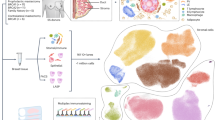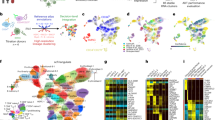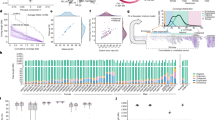Abstract
Myelodysplastic syndromes (MDS) represent a heterogeneous group of neoplastic hematopoietic disorders1. Several recurrent chromosomal aberrations have been associated with MDS, but the genes affected have remained largely unknown. To identify relevant genetic lesions involved in the pathogenesis of MDS, we conducted SNP array–based genomic profiling and genomic sequencing in 102 individuals with MDS and identified acquired deletions and missense and nonsense mutations in the TET2 gene in 26% of these individuals. Using allele-specific assays, we detected TET2 mutations in most of the bone marrow cells (median 96%). In addition, the mutations were encountered in various lineages of differentiation including CD34+ progenitor cells, suggesting that TET2 mutations occur early during disease evolution. In healthy tissues, TET2 expression was shown to be elevated in hematopoietic cells with highest expression in granulocytes, in line with a function in myelopoiesis. We conclude that TET2 is the most frequently mutated gene in MDS known so far.
This is a preview of subscription content, access via your institution
Access options
Subscribe to this journal
Receive 12 print issues and online access
$209.00 per year
only $17.42 per issue
Buy this article
- Purchase on Springer Link
- Instant access to full article PDF
Prices may be subject to local taxes which are calculated during checkout





Similar content being viewed by others
Accession codes
References
Nimer, S.D. Myelodysplastic syndromes. Blood 111, 4841–4851 (2008).
Pedersen-Bjergaard, J., Pedersen, M., Roulston, D. & Philip, P. Different genetic pathways in leukemogenesis for patients presenting with therapy-related myelodysplasia and therapy-related acute myeloid leukemia. Blood 86, 3542–3552 (1995).
List, A.F., Vardiman, J., Issa, J.P. & DeWitte, T.M. Myelodysplastic syndromes. Hematology (Am. Soc. Hematol. Educ. Program) 2004, 297–317 (2004).
Haase, D. et al. New insights into the prognostic impact of the karyotype in MDS and correlation with subtypes: evidence from a core dataset of 2124 patients. Blood 110, 4385–4395 (2007).
Nolte, F. & Hofmann, W.K. Myelodysplastic syndromes: molecular pathogenesis and genomic changes. Ann. Hematol. 87, 777–795 (2008).
Ebert, B.L. et al. Identification of RPS14 as a 5q- syndrome gene by RNA interference screen. Nature 451, 335–339 (2008).
Pellagatti, A. et al. Haploinsufficiency of RPS14 in 5q- syndrome is associated with deregulation of ribosomal- and translation-related genes. Br. J. Haematol. 142, 57–64 (2008).
Gondek, L.P., Dunbar, A.J., Szpurka, H., McDevitt, M.A. & Maciejewski, J.P. SNP array karyotyping allows for the detection of uniparental disomy and cryptic chromosomal abnormalities in MDS/MPD-U and MPD. PLoS ONE 2, e1225 (2007).
Gondek, L.P. et al. Chromosomal lesions and uniparental disomy detected by SNP arrays in MDS, MDS/MPD, and MDS-derived AML. Blood 111, 1534–1542 (2008).
Mohamedali, A. et al. Prevalence and prognostic significance of allelic imbalance by single-nucleotide polymorphism analysis in low-risk myelodysplastic syndromes. Blood 110, 3365–3373 (2007).
Wang, L. et al. Genome-wide analysis of copy number changes and loss of heterozygosity in myelodysplastic syndrome with del(5q) using high-density single nucleotide polymorphism arrays. Haematologica 93, 994–1000 (2008).
Dunbar, A.J. et al. 250K single nucleotide polymorphism array karyotyping identifies acquired uniparental disomy and homozygous mutations, including novel missense substitutions of c-Cbl, in myeloid malignancies. Cancer Res. 68, 10349–10357 (2008).
Viguie, F. et al. Common 4q24 deletion in four cases of hematopoietic malignancy: early stem cell involvement? Leukemia 19, 1411–1415 (2005).
Delhommeau, F. et al. TET2 is a novel tumor suppressor gene inactivated in myeloproliferative neoplasms: identification of a pre-JAK2 V617F event. Blood (ASH Annual Meeting Abstracts), 112 lba-3 (2008).
den Dunnen, J.T. & Antonarakis, S.E. Nomenclature for the description of human sequence variations. Hum. Genet. 109, 121–124 (2001).
Nannya, Y. et al. A robust algorithm for copy number detection using high-density oligonucleotide single nucleotide polymorphism genotyping arrays. Cancer Res. 65, 6071–6079 (2005).
Redon, R. et al. Global variation in copy number in the human genome. Nature 444, 444–454 (2006).
Ruiter, E.M. et al. The mitochondrial 13513G > A mutation is most frequent in Leigh syndrome combined with reduced complex I activity, optic atrophy and/or Wolff-Parkinson-White. Eur. J. Hum. Genet. 15, 155–161 (2007).
Acknowledgements
We thank G. Merkx, J. van Velzen, R. Woestenenk, S. van Reijmersdal, E. Verwiel and C. van den Elzen for technical assistance and J. Boezeman for help with the statistical analyses. W.A.F. Marijt (Leiden University Medical Center) contributed subject samples. This work was supported by grants from the “Dutch Organization for Scientific Research” (NWO, 92003420), the “Stichting Vanderes” (07-183) and the “Dutch Cancer Society” (KWF). P.V.D.B. is a clinical investigator of FWO Vlaanderen.
Author information
Authors and Affiliations
Contributions
S.M.C.L., R.P.K., M.B., M.G.A., B.A.v.d.R., T.d.W. and J.H.J. designed experiments. S.M.C.L., M.B., R.K., M.G.A. and E.V. isolated subject material. R.P.K., A.G.v.K. and E.J.K. were responsible for the SNP-array hybridizations and data analyses. E.S.-L., M.M., P.v.H., M.G.A., R.K. and M.B. performed sequencing experiments and T-cell cultures. P.V., E.V., G.E.V., A.H., T.d.W. and R.A.P.R. provided subject material and participated in discussions. J.H.J. and S.M.C.L. wrote the paper.
Corresponding author
Supplementary information
Supplementary Text and Figures
Supplementary Figures 1–9 and Supplementary Tables 1–9 (PDF 2146 kb)
Rights and permissions
About this article
Cite this article
Langemeijer, S., Kuiper, R., Berends, M. et al. Acquired mutations in TET2 are common in myelodysplastic syndromes. Nat Genet 41, 838–842 (2009). https://doi.org/10.1038/ng.391
Received:
Accepted:
Published:
Issue Date:
DOI: https://doi.org/10.1038/ng.391
This article is cited by
-
Lower Levels of TET2 Gene Expression, with a Higher Level of TET2 Promoter Methylation in Patients with AML; Evidence for the Role of Aberrant Methylation in AML Pathogenesis
Indian Journal of Hematology and Blood Transfusion (2024)
-
Alterations of the expression of TET2 and DNA 5-hmC predict poor prognosis in Myelodysplastic Neoplasms
BMC Cancer (2023)
-
Clonal haematopoiesis - a novel entity that modifies pathological processes in elderly
Cell Death Discovery (2023)
-
Tet Enzyme-Mediated Response in Environmental Stress and Stress-Related Psychiatric Diseases
Molecular Neurobiology (2023)
-
Pedigree investigation, clinical characteristics, and prognosis analysis of haematological disease patients with germline TET2 mutation
BMC Cancer (2022)



